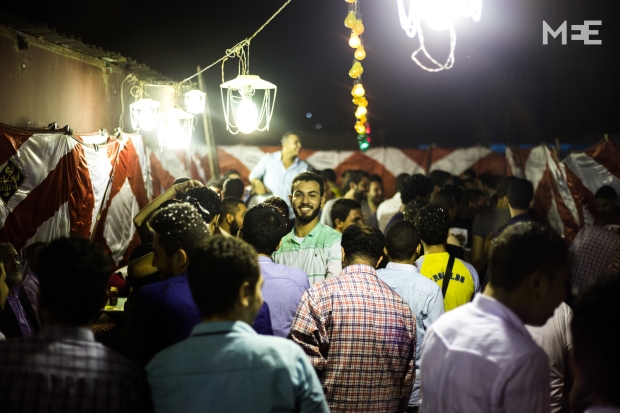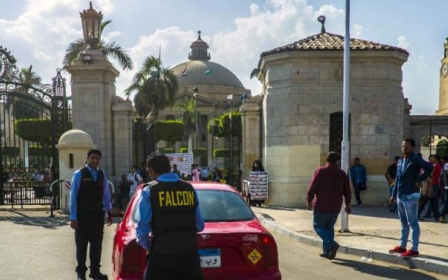The story of a fugitive in Egypt

Henawy - who wishes to remain anonymous for safety reasons - used to be a college student with a bright future ahead of him. He could never have forseen the dramatic impact that his political activism would have on his life; activism that came in the form of public protests after the Egyptian army takeover in July 2013.
Henawy is just one of the many thousands of young people who took part in the protests during the Egyptian uprising following the removal of the first democratically elected president of Egypt, Mohamed Morsi, but who now face a grim future in hiding and on the run from the police.
Henawy was sentenced to 15 years in absentia, forcing him to flee to a remote province in Egypt, after being convicted of planning and participating in murdering police officers - charges he unequivocally denies.
He has had little contact with his family and old friends since his sentence. Henawy sees his case as just one more example of the larger crackdown on all activists who became politically engaged in the anti-government protests that took place after the dispersal of the pro-Morsi sit-ins organised by the Muslim Brotherhood in August 2013.
Back then, the Muslim Brotherhood - the biggest Islamic political movement in Egypt - ordered its members to participate in sit-ins in Cairo and Giza. Supporters of the Brotherhood, and members of other religious organisations, started flooding the two sit-in sites when they saw the army manoeuvring to rule once again.
The protests expanded beyond mere sit-ins though and several thousand people, led by the Brotherhood, took to the streets of the capital and other main governorates of Egypt.
The core backbone of these protests were young men, generally aged under 22, and were either members of the Muslim Brotherhood, Islamists affiliated with other groups, or revolutionaries dissatisfied with the pro-army agenda coming to dominate the scene in Egypt.
Eighteen months later, the protests that were once a daily occurrence have now almost stopped altogether, even in major cities and neighbourhood, since most of the organisers have been detained, forcibly disappeared, killed or have fled. The few that remain are on the run and now live as fugitives.
Henawy was a novice member of the Brotherhood when he started to get involved in the protests and says he had no way of predicting what was going to happen.
“I was waiting for my high school grades to come out when my father announced that he was going to Rabaa al-Adawiya square; I was barely 18-years old at the time. I was very anxious to go and participate as well. At the time, I was full of hope, believing in the real possibility of a powerful, united, Islamic Egypt, from which the fire would be ignited to liberate Palestine."
The days Henawy spent at Rabaa square during the sit-in are still strongly present in his memory, but the shock from what he saw during the police raid that dispersed the sit-in, killing hundreds, is something he tries - unseccessfully - to forget.
“During the six months that followed the dispersal, I kept myself as busy as I could participating in the protests that were taking place almost daily in my neighbourhood."
Henawy’s neighbourhood was a crowded lower-middle class neighborhood with a strong Brotherhood presence, a fact that kept the protests strong for a long while.
It was at that time that Henawy began to take a leading role in the demonstrations. In a short time he became responsible for leading the group chants and helping to organise the young men in the protest.
“I'll never regret for a second what I did in the past two years, but if I could go back in time, knowing what I know now, I probably wouldn’t take any responsibility in the first place. Taking responsibility is what turned [police] eyes upon me.”
Around the end of June 2014, in fear of protests re-igniting for the anniversary of the counter-revolution, a big detention campaign by the government began in Henawy’s neighborhood. A sympathetic lawyer called and told him to leave the house. Apparently, the lawyer heard from an officer that Henawy’s name was included in a long list of names of "suspects" and that the police had planned to raid his house that very night.
“I left my house immediately and went to an apartment that belongs to my mother in a nearby neighbourhood. It turns out, my friend's tip-off was right and my home was raided later that evening.
"The police threatened my father that they would kill me if I ever came back.” Fearing for his son's safety Henawy’s father ordered his son not to return to the neighbourhood under any circumstances.
“Imagine an officer standing in your hall with his rifle in his hand, telling you that he would kill your son if he ever saw him. It was the worst feeling of helplessness I’ve ever felt in my life,” Henawy's father told MEE.
As a result, Henawy kept away from the neighbourhood, participating only in Friday protests and trying to focus more on his education, an especially trying but important task considering he had failed his first year in college as a result of being so busy and distracted by the uprising.
Unfortunately for Henawy though, his goal to refocus on his studies was not to be. As the school year started, police forces began a huge detention campaign in Al Azhar university. Henawy’s name was reportedly mentioned several times while the police detained students. Henawy was ultimately suspended from the college for two years.
Nor did this mark the end of his troubles - Henawy was put on a list of wanted people in his neighbourhood. He now stood publicly accused of being a member of the now outlawed Muslim Brotherhood and was said to have committed several crimes, including the planning and participation of killing a police officer. Henawy was sentenced to 15 years in absentia after being accused of murdering the police officer's son.
“The person they accuse me of killing, the police officer’s son, actually died in a car crash", Henawy insists, maintaining his innocence.
Shortly after his suspension from university, Henawy left Cairo altogether. He is currently living in a remote governorate in an apartment that used to belong to a Brotherhood member who now lives in Turkey. He cannot live with his family or hear from his friends, much less be able to continue his education.
“I can’t travel to Cairo after 10 o’clock because of the police checkpoints. I only saw my mother and my sister a couple of times in the last year, and the only way for me to see my friends who escaped from detention like me, is during social occasions such as weddings,” he said.
I really don’t know what things will be like when I try to go back to university a year from now. If anybody checks my identification card, I will be detained immediately. On the other hand, I have to at least try to go back to university as I don’t have any other choice. What else can I do? I pray to Allah every day to change my luck as my situation is unbearable."
Ahmed Abdul Hakim*, a researcher working at the National Council for Human Rights, told MEE: “Henawy is just one case among thousands of other young Islamists, who are also living on the run, due to their participation in an anti-government protests.
"Their hope right now, as I talked to many of them, is to be integrated once again into society, but the government on the other hand isn’t allowing them to do so. By the beginning of this educational year, I’ve been following up five cases of forced disappearance of students enlisted at Ain-Shams university, two of them were at the university when they were detained. Though there are no protests at all right now in universities, the police are still hitting the students hard.”
Abdul Hakim believes that this might be the government’s worst decision if they are serious about countering "extremism". “When there were protests, at least the young men had a way to express their growing frustration and disapproval. Now with no protests, more and more disaffected young men are easily attracted by radical and extreme groups, and honestly, can you blame them?”
*The names in this story have been altered to protect the identities of the people intereviewed
Stay informed with MEE's newsletters
Sign up to get the latest alerts, insights and analysis, starting with Turkey Unpacked
Middle East Eye delivers independent and unrivalled coverage and analysis of the Middle East, North Africa and beyond. To learn more about republishing this content and the associated fees, please fill out this form. More about MEE can be found here.





